Smalltalk Solutions 2011!

I made it here, even with a delay caused by a plane with a broken tail light :)
The author of this blog, James Robertson, passed away in April 2014. This blog is being maintained by David Buck (david@simberon.com).

I made it here, even with a delay caused by a plane with a broken tail light :)
Florin Mateoc is talking about the "Zen of Smalltalk Algorithm Coding" here at StS - starting off with the difficulties he's run across in terms of comparing code changes over time. Everything is being recorded, and STIC says they'll be releasing the video (no idea what the schedule for that is). I'll be recording the audio for the talks I attend, and I'll be releasing those as part of the podcast over time.
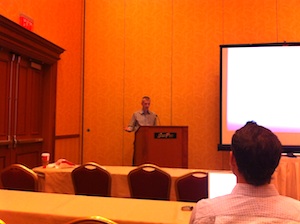
Technorati Tags: sts11
After years of mediocrity and weak sales, Microsoft is finally killing off its Zune media player, Bloomberg reports.
I always wondered why they created the Zune, and then had a completely different group working on phones. It's not as if the Apple example was hard to see :)
Georg just officially "opened" the conference, and now Avi is talking about Big Data, the web, and Smalltalk. Kind of amusing that I got quoted based on something I said at StS 2004 - truly, nothing you say in public dies now :) Anyway, here's Georg:
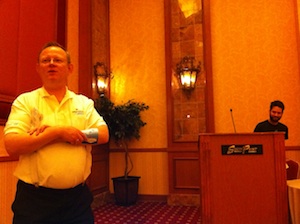
And Avi:

Technorati Tags: sts11
You have to love this intro to a talk:
In the early 1990's ParcPlace failed to license Smalltalk to Sun Microsystems. Thus Java was born (of flames of carelessness) and instead of the world turning into a green paradise of Smalltalk everywhere, it descended into a rocky brittle non-reflective torture pit where the traditional C procedure of banging heads against the wall to make headway prevailed
Here's Kjell Godo delivering that message:
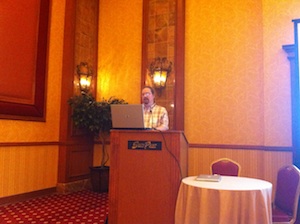
Technorati Tags: sts11
Well, I'm not entirely sure that the Jedi Knight thing works for an entire presentation, but it was funny when they started:

Heh - James Ladd and Sean Allen started giggling about 10 minutes in. The audience does like the slides. I'll have to see about getting access to the slides when I release the audio in podcast form :) They have a site and a Twitter handle
Next up - Martin Kobetic and Michael Lucas-Smith talking about Xtreams - a new streams library (MIT license, in Google Code) they've been working on. It's already ported to multiple Smalltalk implementations (to Gemstone last weekend at Camp Smalltalk).
Why Xtreams? Simplicity and Consistency, mostly. Streams were implemented at a time when computing looked very different than it does now, and they thought it might be useful to revisit the entire idea.
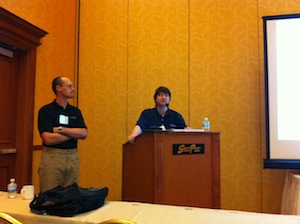
So here's an interesting read example using Xtreams - try the second line of code a few times after you get the stream and see what you get :)
kernel := Kernel.ObjectMemory reading kernel get
Looks like the future involves capped data - AT&T just announced new limits:
AT&T claims their average DSL customer uses around 18GB a month, and these changes will only impact about 2% of all DSL customers -- who the company states consume "a disproportionate amount of bandwidth."
That sounds reasonable until you consider increased use of things like iTunes movie rentals, Netflix, Hulu (et. al.). If you grab a few HD movies, you can start running into those limits faster than you might think.
Of course, the providers would rather have you use their "free" on demand services....
Interesting project announcement from Nicholas Petton:
I would like to share a project I'm working on on my spare time: Jtalk Smalltalk.
http://nicolaspetton.github.com/jtalk
https://github.com/NicolasPetton/jtalkJtalk is an implementation of the Smalltalk language that compiles into JavaScript.
Technorati Tags: javascript, jtalk
First talk of the morning - Stephen Baker's "What Smalltalk can learn from Ruby". He's starting with a brief overview of how we got from the state of the industry in the early 90's to where we are now. I have my own notions on this topic, as many of you already know :)
Anyway, here he is getting started:

So if Smalltalk is so great, why do we have so many problems getting traction? Here's what Ruby has:
I think the main take away from this talk is that we have great tools and web frameworks in Smalltalk, but we don't make it easy enough for people to get into the community.
Stephen Baker set up a new google group to help promote Smalltalk. Go ahead and join now!
Technorati Tags: sts11
John McIntosh is delivering the second keynote - he's talking about Scratch and the iPad (the first public discussion of this, as it happens). We did talk to John and John on the podcast about this awhile back - part 1 and part 2
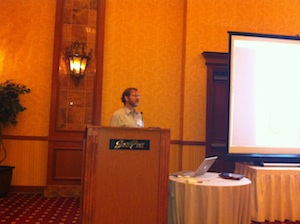
Funny start - John wanted to talk from the iPad, but ran into issues getting video out to the projector :)
I got into John's talk a bit late - Michael and I were recording a chat with John McIntosh, contrasting IOS development and Smalltalk development. I'm here now, and John is talking about what's up with the latest edition (8.0.3) of VA Smalltalk. Here he is:
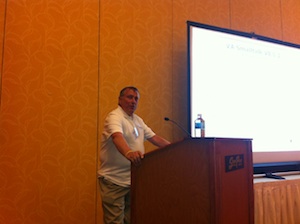
What's coming down the road after the summer release?
I missed a few things on the slides there :) - below are candidate items for future releases - meaning no time scales for this stuff:
And you can download the eval free, or buy a license. There's now a developer program as well, where you can get in-process development builds. The schedule is "irregular" :)
You can also get a perpetual NC license by committing to an open source project (VAStGoodies.com is a good starting point)
I had to take a phone call after the last session, so I got in too late to record the audio for Paul Baumann's talk. The good news is that STIC is recording video, so it'll be out eventually. In the meantime, Paul is talking about a library to create Views (like relational database views) in Gemstone, and he's giving examples of how you achieve the kinds of results you get with various SQL statements in his GS View library. I don't really use Gemstone much (the shop I'm in now is an Oracle shop), but it sounds quite useful. Here's Paul:

I just finished my talk, which seemed to be well received. Right now I'm listening to Don MacQueen (Now with Instantiations) talking about the now cancelled JWars project. It was a system to model military conflicts for planning purposes. Here's Don:
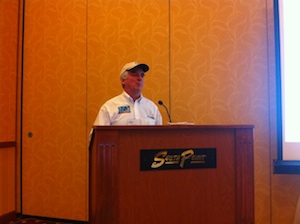
One of the pleasant surprises here at StS 11 was running into Dorin Sandu and finding out about a little project he's been working on. He's been creating an interface between Smaltalk and Lucene, and he's been using BottomFeeder as a testbed for that.
As I did things, the search facilities in Bf are a pretty simple linear search through the item space. Dorin has replaced that with Lucene. To help with that, I really only needed to do a couple of things:
It should be fun to see what comes of that :)
 |
Welcome to episode 1 of "The Hawke Files" - a podcast where Michael Lucas-Smith and I document our journey through Dragon Age 2 On today's podcast, Michael and I kick things off with a discussion of all of the quests that flare up before you do the Deep Roads expedition. There are a lot of them, and you should finish them off - because once you head into the Deep Roads, that part of the game transitions into act 2. |
You can subscribe in iTunes (or any podcatcher) using this feed, or this one for the AAC edition. We should have something set up with iTunes directly soon; check the site for more info on that, or join the Facebook Group and discuss the podcast.
If you want to download the podcast directly, I've provided it in three formats:
Got feedback? Send it to James. Please join the Facebook group and let us know what you think!
Enclosures:
[hawke1.mp3 ( Size: 6088636 )]
 |
Welcome to episode 1 of "The Hawke Files" - a podcast where Michael Lucas-Smith and I document our journey through Dragon Age 2 On today's podcast, Michael and I kick things off with a discussion of all of the quests that flare up before you do the Deep Roads expedition. There are a lot of them, and you should finish them off - because once you head into the Deep Roads, that part of the game transitions into act 2. |
You can subscribe in iTunes (or any podcatcher) using this feed, or this one for the AAC edition. We should have something set up with iTunes directly soon; check the site for more info on that, or join the Facebook Group and discuss the podcast.
If you want to download the podcast directly, I've provided it in three formats:
Got feedback? Send it to James. Please join the Facebook group and let us know what you think!
Enclosures:
[hawke1.m4a ( Size: 8402173 )]
Spotted in The Hitchhiker's Guide to ...
Riak is a scalable database (written in Erlang, C and a little bit of JavaScript) that is being used in production by companies like Mozilla and Comcast. It is based on Amazons Dynamo using key-value storage (bucket-keys to be exact). It has peer-to-peer replication without a specific master - this allows for a fault-tolerant system.
Runar Jordahl created the interface, in Pharo 1.1
Technorati Tags: riak
Patrick Barroca announced two additional themes for Pharo 1.2. You can download them from Squeaksource.
Technorati Tags: pharo
It's Wednesday morning, and MIke Hales is telling us about TeaTime - an efficient messaging system (implemented originally for Croquet) that he ported to VisualWorks for use in the application that he's working on. It sounds pretty cool - here's Mike:
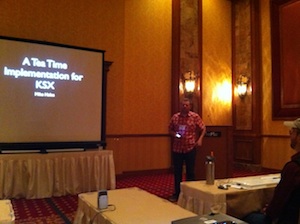
You can learn a lot more about TeaTime from the Wikipedia page for Croquet, which says the following:
TeaTime is a scalable real-time multi-user architecture that is the basis for Croquet's object-object communication and synchronization. It is designed to support multi-user applications that can be scaled to massive numbers of concurrently interacting users in a shared virtual space.
I missed the first 10 minutes or so of Martin McClure's talk - I suddenly developed a cough, and it looked like I was going to disturb his talk. So, I grabbed coffee while he started doing his demo. Here's Martin:

His first demo showed the way they used to do things (largely by hand), which worked, but was tedious. Now he's showing the newer, less ad-hoc code. It looks like they can parse a standard C header file, and extract out the available functions and create a wrapper class (an awful lot like DLLCC, but he's doing it from a workspace as opposed to a tool). One nice thing - you can filter to limit the plethora of things such a thing might try to wrap if you just let it go on its own.
What comes out of that is a wrapper class with a ton of Class Variables, each of which represents an interface to one of the generated functions. Absent the pragmas, the methods that get generated look a lot like what DLLCC generates in VW. One nice thing - the wrapper includes the segment of the header file that became the interface in question, so you can see how you ended up where you are. That makes it a bit easier to hack on things that it doesn't get quite right.
And of course, you can download their 64 bit work and try this stuff yourself.
Technorati Tags: gemstone, foreign functions, sts11
James Savidge works in Cincom support, and he's talking about ways to make your life easier when you need to debug problems that crop up. The first thing he did was a gentle - and funny - request for people to Read the Fine Manual :)
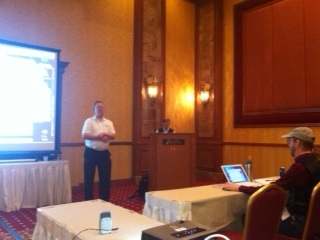
First tip: Remember the file browser, which can give you a quick view of either bytes or formatted source (depending on what you're looking at) of files. Next, he's going through the profiler (and the multi-allocation profiler), which a lot of people forget. I can attest to that - I don't know how many times I've been helping someone track a problem, and had them be surprised when I pulled out the profiler.
There's also the Memory Monitor (contributed), which can help quite a bit. It includes extensive logging facilities. Back when I was at Cincom, I covered this next bit pretty deeply in my screencasts - the various kinds of probes you can insert for information or debugging using the debugger.
Now a newer tool that I'm not familiar with - the benchmarking tool, which originated in ObjectStudio, but now also works in VW. Since it's a UI driven tool, it won't work headless.
Next, he's going over a tool that I've found to be very helpful - the logging for the various network protocols. When you don't know why your protocol requests are failing, this will let you see the traffic exchanges in detail.
As basic as it sounds, don't forget the Transcript (or the new #out message, which came from ObjectStudio). It's highly useful in server apps, because you'll typically toss the Transcript to a file. I've used that a lot.
Need to watch message sends - the Spy Tool (VW and OS) does that. It does not work in Web Velocity yet.
This next bit is something a lot of people are unaware of - command line options for the VM and image.
James is recommending my screencasts (the ones I did at Cincom). Those are still quite useful, but they aren't being updated now - so as time goes by and new releases of the Cincom products go out, they'll get more and more dated.
It's tag team time - Arden Thomas is talking about Polycephaly, and Andreas Hiltner is going to do a demo of using ObjectStudio. Here they are, getting started:
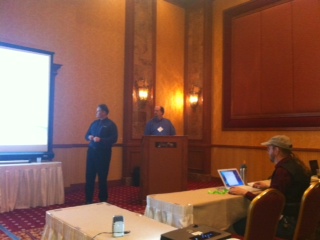
That first link above goes through what Polycephaly is - a way to use multiple Smalltalk images to take advantage of multi-core systems - I'm not going to go into detail here.
Update: Speaking of Polycephaly, Runar Jordahl has written up his experiences using it.
Technorati Tags: sts11, polycephaly, multi core
Last talk of the day and of the conference - Dorin Sandu is talking about integrating Lucene with Smalltalk, so that he didn't have to create his own search tools for the large amounts of data that he deals with on a regular basis.
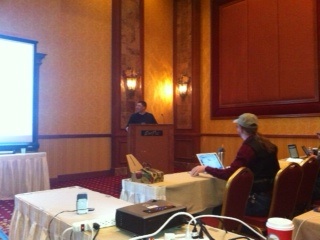
He wanted something small and fast, but also mature with a community to interact with - which is how he got to Lucene. Rather than reproduce the bullet points about Lucene, I'll send you to the website.
The demo is cool - he replaced the existing search facilities in BottomFeeder (which are pretty basic) with Lucene. The kinds of queries that Lucene supports are way, way better than the simple stuff I did :)
Technorati Tags: sts11, lucene, bottomfeeder, search
The conference is ending - Georg is sending us off with a few closing remarks. It was a fun conference, and I've recorded most of it on my H2 Zoom (I think the audio quality is fairly good). Additionally, STIC has been shooting video, although I have no idea how long it will take to get that online. I do know from experience that video editing is very time consuming :)
Good conference, and I hope to see people again next year!
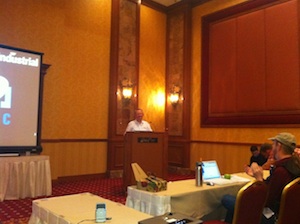
I can't complain about the flight itself - it left on time, and arrived early. It's just that I had forgotten how painful overnight flights are :) Going through the day on the short sleep you manage on a 3 hour overnight flight just doesn't cut it :)
Apparently, taking the redeye from Las Vegas wasn't enough excitement. I was dozing off on my connection from Minneapolis to BWI when the flight attendant announced that the plane had "an electrical problem", and we were diverting to Madison. I wasn't worried, since there wasn't an obvious problem. When we got here there were emergency vehicles all down the runway, and they had us towed to the gate rather than using the plane's power. Then there were firemen meeting the plane, both outside and in the jetway. So.... I'm guessing that we won't just be hopping back on that same plane after a brief stop :)
Bottom line, I have no idea how long I'll be stuck here. My trip just got longer :/
Update: Well, things are defined, but not well. I'm catching a flight from here at 3:30, and then I get a 2 1/2 hour layover in Minneapolis, before I fly from there to Baltimore. That gets in at 10:30 PM. This day just keeps getting longer :)
I had a fairly epic "if it can go wrong, it will" sort of day yesterday - here's what happened:
It was that sort of day.
Google Summer of Code is a global program sponsored by Google that offers student developers stipends to write code for various open source software projects. The Smalltalk community has a successful record of participation in the scheme, under the aegis of ESUG in recent years, and our organisers are looking for students and ideas, (and even better, students with ideas) for our entry in this year’s programme.
Technorati Tags: esug
Sometimes, a seemingly inocuous decision has long shadows. Consider the rolling blackouts in Japan - which are exacerbated by choices made well over a century ago:
The AEG equipment produced electricity at Europe's 50Hz (hertz, or cycles per second) standard while the General Electric gear matched the U.S. 60Hz standard. That probably didn't seem important at the time -- after all, light bulbs are happy on either frequency -- but the impact of those decisions is being seen today. All of eastern Japan, including Tokyo and the disaster-struck region to the north, is standardized on 50Hz supply while the rest of the country uses 60Hz.
Without enough changing stations (they only have enough to handle 1 GW), they can't share power across that divide. Makes you wonder how many "we really ought to update this" meetings took place over the last century that ended with "nah, we have other priorities right now". Now relate that sort of thing to wherever you work and the legacy systems you have lying around. Less critical to be sure, but still....
The whole genre of sites such as Digg seems to be fading. Reddit is suffering a brain drain, and over at Digg, even the founder doesn't use it much. Computerworld explains why:
Getting on the front page of Digg was everything, because the site's millions of users used to read the front page like it was the morning paper. The early movers who collected a lot of friends were able to get even more friends by getting on the front page. A Digg aristocracy emerged. Influence on Digg became a winner-take-all system, with the majority locked out of meaningful participation.
Which made it not terribly different than any arbitrary news site - editors promote stories either way, it's just that the Digg system involved a more ad hoc set of editors who had self selected at some point in time. Even if you posted a story before one of the editors did, you just wouldn't get the votes - they would. That drives a kind of "meh, why participate" mindset, which in turn closes the circle of participation even more. Rinse repeat a few times, and you effectively have an old style writer/editor cycle.
Their handling of messaging just exacerbated things; follow the link for that bit. At the end of the day, I think Facebook became what Digg could have been.

|
I've been playing Dragon Age 2 |
In DAO, you could run a lot of the combats as a button mashing exercise. In DA2, right through Act 2, you really need to run things more tactically. On the Mac (or PC), that's far easier. You can have each character target a specific enemy much, much more easily. Either way though, I'm enjoying the game quite a bit.
Technorati Tags: hawke, da2, dragon age
Welcome to episode 22 of Independent Misinterpretations - a Smalltalk and dynamic language oriented podcast with James Robertson, Michael Lucas-Smith, and David Buck. This week's podcast was recorded at Smalltalk Solutions 2011 with James Savidge, after day one. We went over the talks we attended, what we thought, and our general impressions of the event.
You can subscribe to the podcast in iTunes (or any other podcatching software) using this feed directly or in iTunes with this one.
To listen now, you can either download the mp3 edition, or the AAC edition. The AAC edition comes with chapter markers. You can subscribe to either edition of the podcast directly in iTunes; just search for Smalltalk and look in the Podcast results. You can subscribe to the mp3 edition directly using this feed, or the AAC edition using this feed using any podcatching software. You can also download the podcast in ogg format.
If you like the music we use, please visit Josh Woodward's site. We use the song Troublemaker for our intro/outro music. I'm sure he'd appreciate your support!
If you have feedback, send it to jarober@gmail.com - or visit us on Facebook - you can subscribe in iTunes using this iTunes enabled feed.. If you enjoy the podcast, pass the word - we would love to have more people hear about Smalltalk!
Enclosures:
[im22.mp3 ( Size: 12945645 )]
Welcome to episode 22 of Independent Misinterpretations - a Smalltalk and dynamic language oriented podcast with James Robertson, Michael Lucas-Smith, and David Buck. This week's podcast was recorded at Smalltalk Solutions 2011 with James Savidge, after day one. We went over the talks we attended, what we thought, and our general impressions of the event.
You can subscribe to the podcast in iTunes (or any other podcatching software) using this feed directly or in iTunes with this one.
To listen now, you can either download the mp3 edition, or the AAC edition. The AAC edition comes with chapter markers. You can subscribe to either edition of the podcast directly in iTunes; just search for Smalltalk and look in the Podcast results. You can subscribe to the mp3 edition directly using this feed, or the AAC edition using this feed using any podcatching software. You can also download the podcast in ogg format.
If you like the music we use, please visit Josh Woodward's site. We use the song Troublemaker for our intro/outro music. I'm sure he'd appreciate your support!
If you have feedback, send it to jarober@gmail.com - or visit us on Facebook - you can subscribe in iTunes using this iTunes enabled feed.. If you enjoy the podcast, pass the word - we would love to have more people hear about Smalltalk!
Enclosures:
[im22.m4a ( Size: 17988875 )]
Today's Smalltalk 4 You looks at loading Seaside into a base Pharo image from scratch, using Monticello. If you have trouble viewing it here in the browser, you can also navigate directly to YouTube. To watch now, click on the image below:
If you have trouble viewing that directly, you can click here to download the video directly. If you need the video in a Windows Media format, then download that here.
You can also watch it on YouTube:
Enclosures:
[st4u59-iPhone.m4v ( Size: 8014247 )]
I finally pulled the plug on my unlimited iPhone data plan - I needed to travel to NYC this morning, and I needed network access. The Acela has WiFi, but when it's your own nickel, it's a bit pricey (which is really something that the HSR backers need to consider).
Anyway - a quick phone call to AT&T and I was sharing a hotspot with my Mac, my work laptop, and my daughter's Mac. I can work, as the VPN connection worked out as well. A bit slower than what I'm used to at home, but hey - it works. I'll have to watch the b/w usage; I already explained to my daughter that streaming video is not something we want to use on this :)